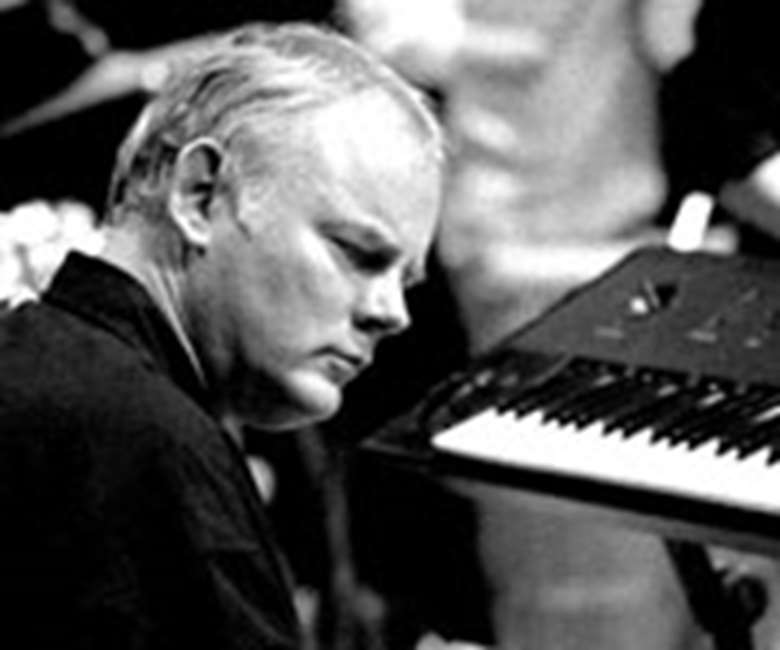Steve Lodder - Keyboards
Tuesday, March 20, 2007
David Gallant talks to the keyboardist about how he got started, the instruments he has played over the years and his all time favourite choice. “For me, everything starts with Bach,” says Steve Lodder. “He laid out the seeds for everything that would happen in the next two hundred years and it’s just fascinating to see it’s all in there”. Lodder remembers “messing around” on the family’s piano from the age of five of six. “My earliest memory is of my father deciding that we needed a new one,” says Lodder.

“But the only way that my father could see of getting rid of the old one from a first floor room was to chop it up and throw it into the garden. I can still hear the noise that the piano made as it hit the ground!” When he was seven, Lodder started formal lessons on the “new” piano, which was also supported at school, where he remembers there was a very strong musical tradition. “We used to do things like Verdi’s Requiem as an end of term concert. Big projects. I remember we also did Bach’s D minor mass.”
As well as the piano, Lodder was also playing the violin and became leader of the school orchestra. “I used to listen to a lot of classical music”, he says. “I can remember getting a book from the library that described how Tchaikovsky used to feel the rhythm so strongly inside him, that he broke the glass in the window, very Romantic! But that also made me think that there must be more to this music than meets the eye.” He recalls his then response to jazz. “In my teens, jazz was old man’s music – I didn’t like the sound of it – I found it very sugary. But I remember listening to Bill Evans and thinking, I don’t particularly like the sound of that. It was due to the impressionist harmonies I suppose, and I was into high energy things at that stage, classics and rock. Then when rock went more progressive and improvising came into it, I started listening to people who were improvising more, like John Etheridge, Robert Wyatt, National Health and Mike Westbrook.”
Following in his grandmother’s footsteps, Lodder started to the learn the organ when his legs were long enough, “when I was about 14.” He continues: “I started playing because there was one at school and because of the possibilities of sound and the choice of timbre fascinated me.” In 1969, Lodder went up to to Gonville and Caius [one of the colleges of Cambridge university] on an organ scholarship. “I was there until 1972,” he says. “Then I did a teacher training degree. I was following the path my parents had chosen for me: Uni – teacher training – teach in a well known grammar school then try and make your way from there into professional organ playing. I remember one morning being offered a job at Watford Grammar School and thinking, no: I don’t actually want to do this.” Eventually Lodder answered an ad in Melody Maker for a keyboard player in what was described as a fusion band. “I thought – that sounds interesting, so I went along and to my surprise, actually got the audition. We were called world service, and played vastly over aspirational music – probably quite badly, but we were learning a lot along the way. Looking back at recordings, it was ambitious but not always successful.” He laughs. “But when you’re in you’re 20s you’re allowed to be – aren’t you!”
Digital synths’ were beginning to make a breakthrough and Lodder was making the most of the early developments. “I used the Yamaha DX7,” says Lodder. “It went heavily out of fashion, but at the time it was an extraordinary breakthrough from analogue to digital. It meant that you could mould the detail of the sound. And then of course along came the midi, where synths and computers could talk to each other – and things became a lot more complicated. You could now play sequences live, playing sequences of notes with maybe eight or 16 different sounds happening at the same time mixed in with live playing.”
So what’s the current set-up? “I’m playing a Korg,” he says. “The move to Korg really came about because of the Wave Station, which was a real synthesiser’s synth. It introduced movement back into synths, because in the late-80s synths had become very sample dominated. It had seemed that a lot of the expressive possibilities with the instrument had been thrown out with the bath water." Lodder also uses a Korg Triton, various samplers and a Yamaha synth called the “Motif”. “I also have a thing called the Rhodes ‘Croma’, which is an analogue synth with digital controls,” he says enthusiastically. “It’s kind of the best of both worlds. Digital control means it doesn’t drift out of tune every two seconds, but it’s got that quality of sound when you want it.” As we speak, Lodder’s time is taken with two separate projects. “I’m currently working with Monica Vasconcelos, bassist Dudley Phillips and Brazilian percussionist Adriano Pinto,” he says. “It’s all on a Brazilian groove with various sound influences.”
He's also been working as part of a trio with guitarist Mike Outram and drummer Asaf Sirkis. “Asaf spent two years in Israel listening to the organ music of Messiaen,” says Lodder. “He has had no formal compositional training, but when he came out of it he wrote some pieces for organ, guitar and drums, which we have recorded using a real church organ.” They have already completed two albums and are working on a third. “It’s been a real challenge. I’ve had to find my foot technique all over again!”